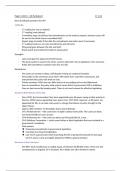Paper 2 Unit 2 – UK Parliament 17.1.24
How do bills get passed in the UK?
12CR3 RA
- 1st reading (no vote or debate)
- 2nd reading (main debate)
- Committee stage (scrutinised and amendments can be made by experts; extreme cases will
be sent to the whole house committee/HoC)
- Report stage (consider if they like the amendments and make more if necessary)
- 3rd reading (read out, no more amendments and will vote)
- Ping pong (goes between the HoL and HoC)
- Royal assent (convention/formality to always give)
Strengths
- Laws must gain the approval of both houses.
- The party system is weak in the Lords, so peers take their role as legislators more seriously.
- Public bill committees scrutinise every line of a bill.
Weaknesses
- The Lords can amend or delay a bill despite it being an unelected chamber.
- Party whips in the Commons mean that’s MPs often don’t vote their consciences, but
instead how their party tells them to vote.
- Private members’ bills have very little chance of succeeding and can be filibustered.
- Even in committees, the party whip system means that if a government MP is ambitious,
they are best served by keeping quiet. There is not much reward for effective legislating.
Structure/Role/Powers of the HoL
- Since 2010, the Conservative Party have appointed more life peers owing to their priority in
the Hoc, WITH Labour appointing more peers from 1997-2010. However, as life peers are
appointed for life, it can take many years to change the balance of party strength in the
Upper House.
- Approx. 800 members, 92 hereditary peers and 26 bishops.
- 1911 Parliament Act -> the Lords have no right to delay money bills. The Lords can delay
non-financial bills for up to 2 years.
- 1949 Parliament Act -> the Lords can delay non-financial bills for 1 year.
- 1945 Salisbury Convention -> Lords cannot delay or block legislation that was included in a
government’s manifesto.
- Main powers
Proposing amendments to government legislation.
Can delay non-financial legislation.
Can veto if a government tried to prolong the life of parliament beyond its max legal
term (5 years). Lords are legally allowed to FORCE a general election.
Structure of the Commons
- 650 MPs. Each constituency is roughly equal, of between 60-80,000 voters. There are 533
constituencies in England, 59 in Scotland, 40 in Wales and 18 in Northern Ireland.





